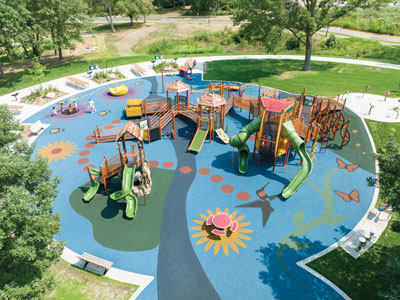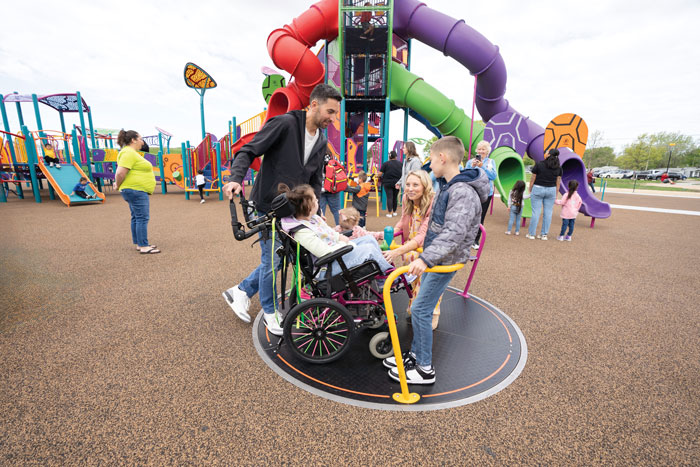An adventure takes you to new places, reveals new ideas and provides a sense of awe, wonder and exploration. But it’s more than that for children. Bringing adventure into the playscape is critical to child development and helps children cultivate skills that transcend the playspace. Learning how children develop through adventure play can help us design places and spaces that foster this as part of their overall play experience and bring age, ability and preference into the design. After all, adventure will differ for each child, and creating a space where everyone can find the best of themselves through play is always a number one goal.
Managing Emotions

Outdoor adventure play triggers a release of endorphins and serotonin in the brain, which help children process emotions and reduce stress levels. It can also help them express frustration and cope with disappointments in a productive way. Learning this at a young age will help them as they face the challenges that come with growing up. Fast-paced play is the perfect way to release these healthy brain chemicals—sliding, spinning and swinging all contribute to fast movement and a space that brings out adventure will have these experiences for all children. Consider options that allow independent play for as many children as possible by using flush-to-the-surface options when available and innovations that bring opportunities to transfer for children who can and prefer to transfer.
Awe Experiences
Awe is an emotion that helps children gain perspective, connect to their community, increase positive interactions and enhance curiosity and creativity. One way to experience awe is through adventure—climbing to the top of a playground tower or a tree and seeing the world from a different perspective, noticing the way a flower opens on a nature walk or even learning about pollination in a pollinator playspace. Bringing awe into every day will build healthier, happier children and adults!
Confidence and Resilience
Taking on and completing new challenges empowers kids with a sense of accomplishment and self-confidence. As they overcome obstacles, they develop resilience and determination—skills that set a solid foundation for future success. Climbing, sliding and spinning are all part of an adventurous play experience and contribute to building confidence and resilience. Outdoor obstacle courses are another way to incorporate adventure into play for people of all ages. Courses that are designed for kids ages 5 to 12 and older children and adults 13+ bring everyone together for adventures outside and provide them with consistent ways to challenge themselves.
Social Skills and Teamwork
These skills are ones we all need every day and can be developed and enhanced through adventurous play. Active activities such as climbing, spinning and sliding often involve cooperation and collaboration, enabling kids to build social skills and practice working in teams. Obstacle courses allow children to practice communication and conflict resolution with people of different ages and fitness levels.
Bringing adventure to play has numerous developmental benefits, is fun and creates outdoor spaces kids (and adults) want to come back to again and again—a win for every-one! RM
ABOUT THE AUTHOR
As marketing communications and education specialist for BCI Burke, Sarah Lisiecki combines a passion for play, the outdoors and movement with more than 10 years in the play industry and hundreds of presentations given on topics such as inclusive design, musical play and trends in play at parks and recreation conferences, district meetings, landscape architect firms and representative trainings.



